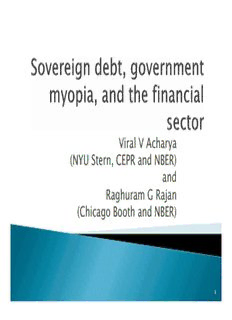
Viral V Acharya (NYU Stern, CEPR and NBER) and Raghuram G PDF
Preview Viral V Acharya (NYU Stern, CEPR and NBER) and Raghuram G
Viral V Acharya (NYU Stern, CEPR and NBER) and Raghuram G Rajan (Chicago Booth and NBER) 1 In some cases, governments took on excess debt and deficits prior to the financial crises Greece, Italy United States? In others, governments took on excess debt and risks while rescuing failed banks or stimulating the economy Ireland United States? And, in yet others, private debts and growth slowdown engulfed governments too (Spain) 2 Governments keen to expand fiscally. In favor of their own vote-bank. Government reluctant to cut back fiscally, even in wake of mounting debt on balance-sheets. Sovereign debt held substantially by own banks. Sovereign debt used in repos/as collateral to facilitate financial transactions. Sovereign default will cause “collateral damage” Broner-Martin-Ventura (2010), Bolton-Jeanne (2011), Gennaioli-Martin-Rossi (2011), … Is this why markets keep lending to sovereigns? 3 1 8 . e m o H 6 e . r a h s of n a 4 e . m 2 . 0 CY SI BE AT NL UK LU FR FI SE PT DE IE DK IT MTGRES HU PL Source: Acharya, Drechsler and Schnabl (2011) 4 Governments are short horizon and populist. They care about current cash flows. They will not default so long as they can borrow. No net repayment They can pass on the burden of repaying debt to future governments. As their financial sectors get more entangled with sovereign debt, the costs of default increase. Net debt repayments are this way enforceable. And knowing this, creditors lend even to poor governments with low default costs. Myopia may be a way for governments to commit! 5 Country, government, private sector, banks Governments have short horizon – rule for 1 period & behave as if it is their last period. Want to maximize spending on populist schemes Period 1 Country enters period with legacy debt repayment (cid:1830) due of (1+r) (cid:2868) (cid:1830) Can raise new debt (cid:2869) (cid:1872) Can levy taxes (cid:2869) Question: What is sustainable? (cid:2868) 6 Private sector (corporations/households) (cid:1831) Enter period with some endowment (cid:2868) (cid:1863) Chose to invest in projects keeping in mind (cid:2869) current and prospective tax rates. Rest invested in government bonds (only financial asset), e.g., as savings into a financial sector Taxes thus have a “crowding out” effect on private investment; conversely, a “crowding in” effect for savings and government debt 7 Default disrupts domestic financial sector Dom zD (1 r ) Cost of default at date 2 equals 1 where For Dom D D D 1 1 1 (cid:1878) is the vulnerabilityof the financial sector, exogenous for now; endogenized later… Several explanations Banks may hold government bonds for liquidity and safety Bonds may serve as collateral in inter-bank flows 8 ___________________________________________________________________ Period 1 Period 2 + t=0 t=1 t=1 t=2 (1) Existing (2) Govt (3) Short (4) Govt (5) New govt (6) Long run foreign debt decides run collects taxes comes in; corporate D and whether to corporate t f (k ); Govt decides output f (k ) 0 1 1 1 2 1 corporate announce output f (k ) Govt repays whether to realized; Govt 1 1 endowment default on realized; debt of announce collects taxes E . legacy debt; D (1+r) and default on t f (k ); 0 0 2 2 1 It announces raises new legacy debt; Govt repays tax rate t ; debt (if no announces debt of 1 Corporate default): tax rate t ; D (1+r) 2 1 sector makes Externally (if no default) investment financed debt k and saves is DFor , 1 1 the rest (E - 0 domestically k ) 1 financed debtDDom. 1 9 Corporations/households: How much to invest in production and how much to allocate to financial savings (domestic government bonds)? Period 1 government Whether to service legacy debt or default How much to tax This determines how much it will spend Period 2 government Whether to service legacy debt or default (cid:3014)(cid:3028)(cid:3051) (cid:1872) How much to tax (trivially equal to ) 10
Description: